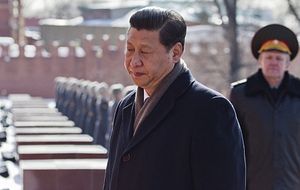A few curated links to wrap up the week:
Given the current instability in Pakistan, Prime Minister Nawaz Sharif declared that the upcoming visit by Chinese President Xi Jinping would be postponed, according to the Associated Press. He blamed government protesters for having to postpone the visit. The move will likely be perceived as a snub by Beijing, which places great value on the ceremony of official state visits. China and Pakistan refer to each other as “all-weather” partners and have a close bilateral relationship. For Pakistan, canceling the visit is additionally troublesome as Xi will also visit New Delhi on the same trip. Over at China Power, Shannon described the ramifications of a cancellation or postponement in greater detail:
Such a move, it should be made clear, would be a last resort for Beijing. China values its partnership with Pakistan, one of China’s rare historic “all-weather” friends. Postponing Xi’s visit to Pakistan would be seriously damaging to the relationship, particularly if Xi sticks to his plan to visit India. Beijing has been exceptionally enthusiastic about working with new Indian Prime Minister Narendra Modi, a worrying sign for Pakistan. Meanwhile, despite a promising beginning under Modi, India-Pakistan relations have lapsed back into their old pattern of hostility. If Xi were to stop in New Delhi and not Islamabad, it would send a worrying signal to the Pakistani government that Beijing is more interested in India than Pakistan — and that is not a message Beijing is interested in conveying.
So far, all signs indicate that Xi’s plans to visit New Delhi are still on track (and likely won’t change). Xi will visit South Asia, stopping in New Delhi but not Islamabad.
At long last, the U.S.-brokered, U.N.-supervised recount and audit of the 8 million-some votes that were cast in the June 14 run-off presidential election in Afghanistan is complete, according to Pajhwok. The audit took 50 days and suffered repeated setbacks from Afghanistan’s two presidential candidates, Ashraf Ghani and Abdullah Abdullah. The latter threatened to boycott the audit three times. An announcement of the official results is imminent but Afghanistan’s Independent Electoral Commission (IEC) has not yet given a date. It is likely that the result will be announced in the coming days given the massive delay in this year’s presidential succession. In a letter to this week’s NATO Summit in Wales, both candidates additionally pledged to hold to the unity government agreement following the resolution of their differences over the presidential election.
This week Al Qaeda declared that it was opening a wing on the “Indian Subcontinent.” The chief of the Indian Air Force, on Friday, noted that India was prepared to handle the consequences of an Al Qaeda expansion into South Asia: “There is a threat perception from such agencies but the nation is prepared for it,” he noted.
Australian Prime Minister Tony Abbott is in India for a two-day official visit. The visit will result in a landmark agreement between India and Australia on nuclear materials. Under the terms of the agreement, the Australian government will be able to export uranium to New Delhi for civilian nuclear use. The deal is significant considering that Australia has a third of the world’s known uranium reserves. India’s status as a nuclear weapon state outside of the scope of the Nuclear Non-Proliferation Treaty (NPT) had delayed the deal for some time. The deal comes after a lengthy bilateral negotiation process over nuclear safeguards. With the visit, Abbott is also the first non-South Asian head of government to visit India since Modi’s May inauguration. Akhilesh Pillalamarri takes a look at the visit in more detail over on our Oceania blog.
A report in Russia’s state media alleges that Russia and India are planning to carry out large air and air defense exercises every year. The report also notes the Indian Air Force’s interest in purchasing “Russia’s S-400, S-300PV, Buk-M1 and Pantsir-S1 anti-aircraft missile systems.”
































